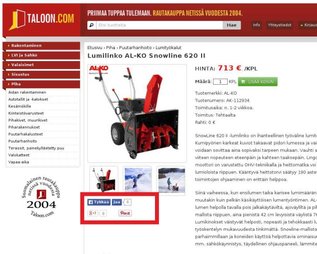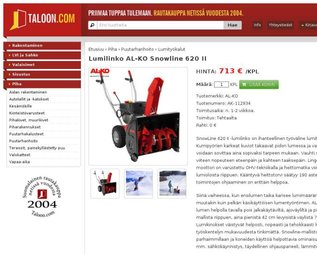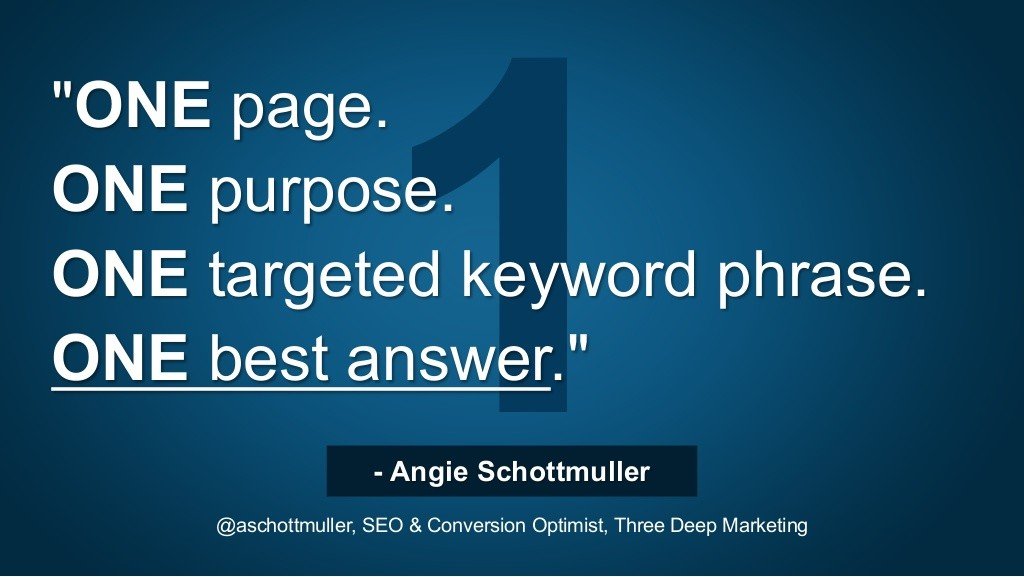How Taloon Used A/B Testing To Increase Click Through Rates using VWO Testing
About Taloon
Taloon.com is a Finland-based eCommerce hardware store that sells plumbing, electrical, gardening supplies, and other construction material.
The company uses the VWO platform for its website optimization requirements.
Goals
Taloon wanted to increase conversions on its product pages (that is, clicks on the call to action button Add to Cart) by reducing distractions that prevent visitors from acting on the CTA.
Tests run
This is what the original version looked like:

You can see in the above screenshot that social sharing buttons were placed right below the product photos.
Going against the popular notion, Jani Uusi-Pantti of Taloon.com decided to remove the Google+, Pin it, and Facebook share buttons from its product pages. But before implementing a change that was so radical (in the light of accepted best practices), Jani wanted to A/B test if the change would impact the effectiveness of the CTA button.
He set up a test by using the VWO a/b testing platform. The test ran for 2 weeks.
This was the variation that was pitted against the original:

Conclusion
Compared with the original, the variation recorded an 11.9% increase in CTA
click-throughs.
The confidence level of 95% delighted Jani, who said “I didn’t really expect the a/b test results to be this good. Nice surprise!”
Based on the test results, Jani implemented the change on its website.
Conventional wisdom is all for social sharing:
- About 39% of digital marketers around the world believe social sharing is effective in boosting conversions.
- 84% of online shoppers use at least one social media site.
That is why Taloon’s A/B test results are surprising. But that’s why A/B tests are recommended, because the context of each business/website is unique. What works for one business may not work for another, even if it is in the same business. Start a free trial to see how.
It is thus useful to figure out what worked against social sharing buttons in Taloon’s case. We believe there are perhaps 2 reasons for this:
1) Negative social proof
“Social proof isn’t always the best proof – you would think that social proof helps boost conversion rates, but it doesn’t always work that way.”
According to Jani Uusi-Pantti, the number of shares on most of Taloon’s product pages was zero. While a high number of shares and likes acted as a positive reinforcement, a low number of shares bred distrust in the minds of customers about both the company and the quality of its products.
2) Distraction from the main goal
It’s considered a best practice to have a clear defined goal for each page and push people toward that goal by using a CTA. Angie Schottmuller, who is considered an authority on inbound marketing, emphasizes this point here:

While Taloon.com used add to cart as the prominent CTA on its product pages, the social sharing buttons acted as a distraction.
As Jani observed, “Maybe those share buttons were just extra clutter and distraction on a very good spot.”
You can also test your hypotheses for conversions with VWO A/B testing. Take a free trial today!

Location
Finland
Industry
Retail
Experiment goals
Increase CTR on the main CTA (Add to Cart)
Impact
11.92% increase in Click-through rate













